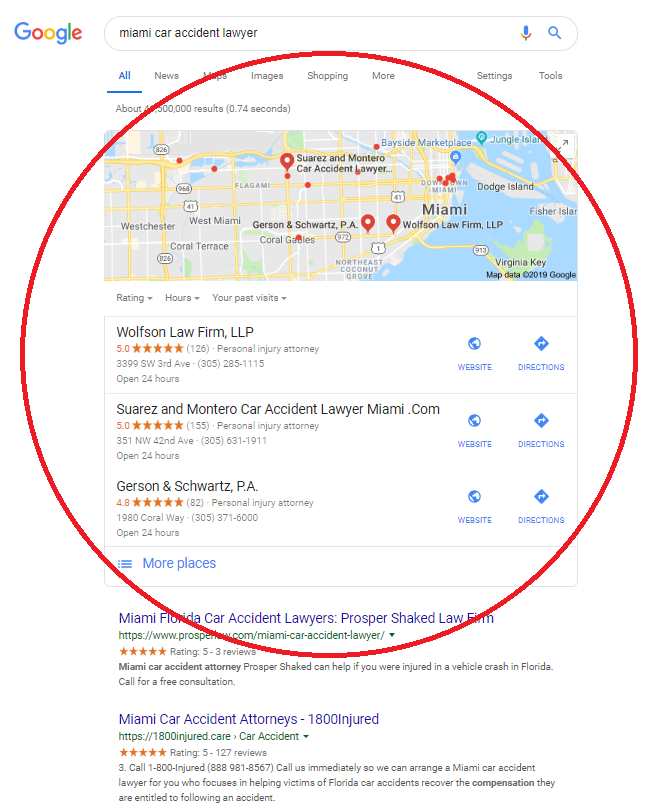The online legal marketing world was overrun last week with news that lead generating agencies had taken over the local SEO listings for searches related to car accidents. The news broke just after we had published our blog on Google’s patent that could track a site’s click-through-rate and alter future rankings, though, so we scheduled it for this week.
In that short amount of time, though, Google seems to have altered the algorithms it uses for the “local box”: The paid lead sources have disappeared. Suddenly, this post isn’t about the weaknesses inherent in Google’s local algorithms – it’s about how quickly search engines adapt to marketers who overuse a loophole in the system.
Refresher: The Local SEO Box
When people conduct searches that seem designed to find local results – like “Boston criminal defense lawyer” or “Dallas divorce attorney” – the top of Google’s search engine results page (SERP) will often have a small map and a couple of sites. This is the “local box.” Search engine marketers have long since learned that it uses a different algorithm than the rest of the results on the page: The local box promotes sites that have keywords in their business’ name and that have strong indications of a local presence, like a local phone number and address.

Paid Referral Agencies Flood Local Boxes for Personal Injury Lawyers
The search engine optimization (SEO) news outlet Search Engine Land broke the story on March 25, 2019: Marketers seemed to have cracked Google’s local algorithm and had flooded local boxes in nearly all major cities with paid referral companies for searches that included “car accident attorney.”
In some cases, the entire local SEO box was filled with these referral companies, kicking all of the personal injury law firms out of the box. These referral companies did not have a website or any reviews, but did have local addresses and phone numbers with an area code that was local for the search query, and always had the phrase “car accident” in their “business” name. Aggrieved law firms tried calling the number, but were met with either a voice mail recording or a phone representative who would not reveal the name of the company they worked for.
Other law firms began complaining about unsolicited calls from local lead referral agencies trying to sell leads for hundreds of dollars each.
Google Tweaks Local Algorithm: Problem Disappears
The legal marketing world was in an uproar at how easy it was for lead referral agencies – not even another law firm – to usurp the local box. One went so far as to say that Google was in on the deal.
And then, sometime in the past week, everything stopped. Law firms were back in the local box. The lead generating agencies were gone, again. Attorneys could type in their area of practice and the phrase “car accident lawyer” and recognize the names of competitors.
What happened?
Google reacted. They saw that someone was abusing a loophole in their system, and either tweaked some of the details in their algorithm to close that loophole or manually wiped out all of the offending results while they came up with an algorithmic solution.
That’s how search engines work. We saw this before with the demise of the mug shot publishing industry way back in 2013 – search engines saw something they didn’t like online and changed the rules. The struggle between search engines and search engine marketers is a bit like an arms race: Each side is reacting to the other and looking for a way to get the upper hand.
It should also be noted that this is exactly why search engines do not reveal details about their algorithms. If marketers knew how the rankings were produced, they would find ways to game the system and force search engines to change the rules.
